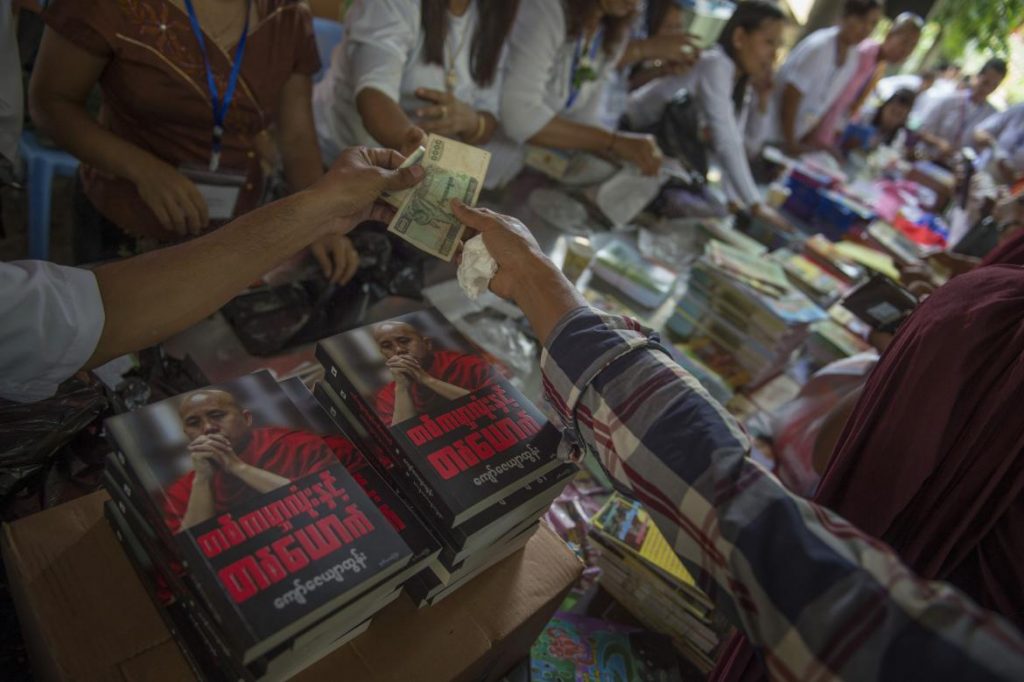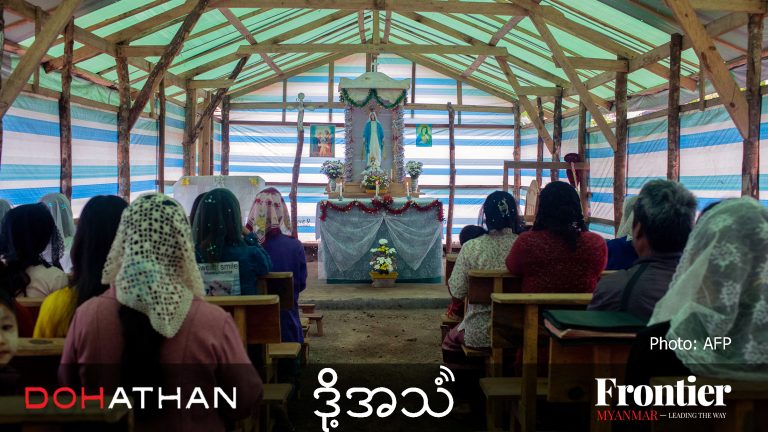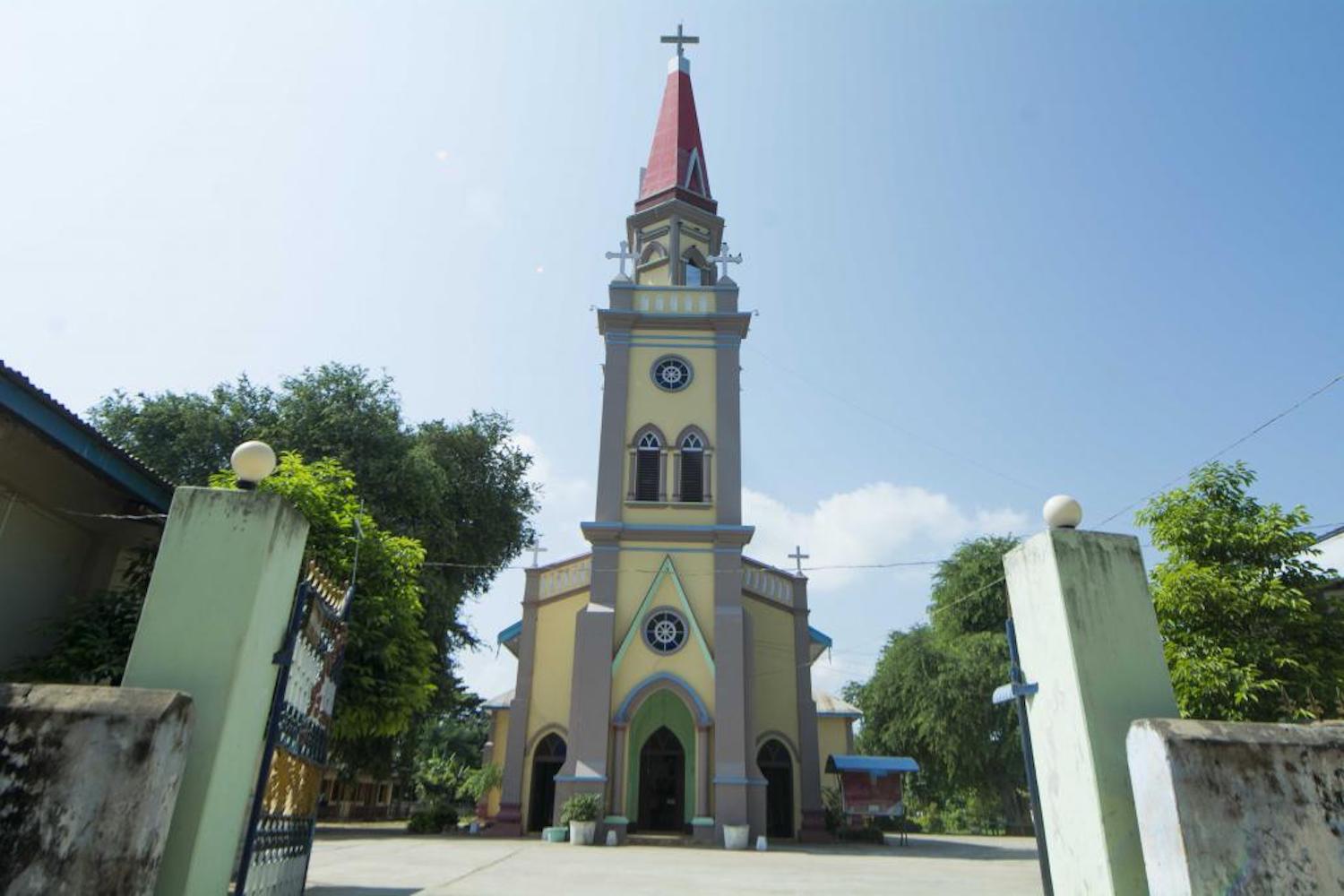The nationalist group known as Ma Ba Tha and one of its leading members, U Wirathu, have reacted defiantly to moves aimed at curbing their malevolent influence, posing a delicate problem for the NLD government.
By SITHU AUNG MYINT | FRONTIER
ON MARCH 10, the State Sangha Maha Nayaka Committee, the supreme body representing the nation’s community of monks, or sangha, issued an order banning the infamous monk U Wirathu from giving speeches for a year.
This is not the first time the committee, better known as Ma Ha Na, has taken on Wirathu. Last year, the committee ruled that Ma Ba Tha, the hardline nationalist group of which Wirathu is a leading member, was not a legal organisation. The decision was endorsed by the National League for Democracy, which had only taken office a few months earlier.
Some monks have been sharply critical of the NLD since it was in opposition. What are the reasons for that? And now it is in government, will the NLD be able to control Ma Ba Tha, including Wirathu?
The State Sangha Maha Nayaka Committee said it imposed the ban because Wirathu had “repeatedly” used hate speech against other religions to cause communal strife and hinder efforts to uphold the rule of law. It also said he had taken sides with political parties to inflame tensions. Wirathu has often used hate speech to refer to Muslims, including on social media. He has done it so often it is not unusual.
Support more independent journalism like this. Sign up to be a Frontier member.
The clearest evidence that Wirathu had hampered the rule of law was his response to the assassination of constitutional expert U Ko Ni, a legal adviser to the NLD. On social media and in interviews, Wirathu expressed thanks to those involved in the killing of Ko Ni. He said Ko Ni was like a mad dog and he was grateful to those who had killed him.
Wirathu’s political bias is evident in his comments about the NLD. He has accused State Counsellor Daw Aung San Suu Kyi and the NLD of giving preferential treatment to Muslims and has called on followers to support the military-backed Union Solidarity and Development Party and the Tatmadaw.
At a recent speech at Kyonku village in Ayeyarwady Region’s Ngapudaw Township he compared Aung San Suu Kyi’s government unfavourably with that of former President U Thein Sein. In the speech in Thein Sein’s home village, he also said that Buddhist women were better off marrying drug addicts, alcoholics and even dogs than wedding Muslims.
In an apparent reaction to the year-long ban on giving speeches, Wirathu staged a silent protest at an event in Ayeyarwady’s Einme Township on March 11, appearing on stage with masking tape across his mouth while a sound system played one of his sermons. The event was streamed live on Facebook. When this column was written, it was not clear whether the State Sangha Maha Nayaka Committee or the government would respond to his protest.
There are many monks in Ma Ba Tha who sincerely believe that what they consider to be “race”, and Buddhism, must be protected. Some of these monks are involved in anti-Muslim activities that they say are necessary to protect race and religion, and for the same reason a few oppose the NLD and support the USDP. This was clear during the campaign for the 2015 election.
In July last year, the State Sangha Maha Nayaka Committee declared that Ma Ba Tha was not a lawful monks’ association, a decision supported by Minister for Religious Affairs and Culture U Aung Ko. The minister also called on the committee to take action against any Ma Ba Tha member who had engaged in hate speech.
Following the committee’s announcement, the Ministry of Religious Affairs and Culture asked sangha organisations to take down Ma Ba Tha signs. Despite the ministry’s request, Ma Ba Tha headquarters continues to operate and is still issuing statements.
Because of the enormous sensitivity involved in Buddhist majority Myanmar, it is extremely difficult for the NLD government to control an organisation such as Ma Ba Tha. On one hand, most monks want to protect the Buddha Sasana (religion). On the other hand, senior Tatmadaw officers and retired generals are paying homage to Ma Ba Tha leaders.
A few monks with extreme nationalist views are dreaming of a scenario in which anti-Muslim hate speech will incite massive sectarian conflict that will result in the Tatmadaw seizing power and ending the transition to democracy. Religious intolerance is a very dangerous problem and the only solution is to take effective action against extremists.







